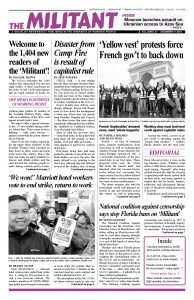In an aggressive inflammation of tensions, the capitalist rulers in Moscow ordered Russian forces to fire on and seize three Ukrainian naval vessels, including a tugboat, and their crews as they tried to pass through the Kerch Strait Nov. 25 to the Ukrainian port of Mariupol. The Russian forces parked an old tanker under the Kerch bridge to block the channel. The Ukrainian ships were attacked by a Russian jet, helicopter and troops on Russian vessels.
The Russian government then arrested the 24 naval personnel, some of whom had been wounded in the attack, and took them to Moscow to be put on trial.
The Kerch road bridge, the longest in Europe, built by Moscow to link the annexed Crimean Peninsula to Russian territory, was opened in May 2017. A railway bridge is due to be operational by the end of 2019.
The approaches constrict the Kerch Strait to a narrow channel under the high point in the bridge. Kiev opposed the construction while European governments and Washington imposed additional sanctions on Russia over it.
Moscow has been engaged in an ongoing series of brazen violations of Ukrainian sovereignty since the mass popular Maidan uprising overthrew the pro-Russian-government of Ukrainian President Viktor Yanukovych in 2014.
The Russian rulers responded by seizing and annexing the Crimean Peninsula and fomenting a bloody war in eastern Ukraine that imposed Moscow-backed forces still occupying parts of Donetsk and Luhansk oblasts today.
Crimea was historically the homeland of the Crimean Tatars. In 1944 Joseph Stalin forcibly deported the Tatars en mass into Russia’s interior and fostered emigration from Russia to repopulate parts of Crimea. After decades of protest, the Tatars were finally allowed to return to Crimea in the 1950s, many to find their land had been stolen. Since seizing Crimea in 2014, Russian rulers have carried on a relentless campaign against the Tatars, expelling Mustafa Dzhemilev and other Tatar leaders.
After the assault on the three vessels, Ukrainian President Petro Poroshenko claimed there was danger of a “full-scale war,” as he pointed to a Russian military buildup along the border. The Ukrainian president imposed martial law in the eastern half of the country for 30 days, while closing the Ukrainian border to Russian men between 16 and 60 years old. He said this was to prevent the formation of “private armies” in Ukraine.
Martial law allows the government in Kiev to clamp down on political rights.
Poroshenko — who made his name while becoming a billionaire from his Roshen chocolate empire and other capitalist ventures — has become increasingly unpopular. The next presidential election is set for March, and if current polls hold, he will lose badly. Some think he’s using his response to the attack, especially the martial law, to try to boost his standing.
Moscow says the three ships were maneuvering threateningly and had to be stopped. While Moscow forces are permitting Russian-bound ships into the Sea of Azov to the port of Rostov-on-Don in Russia, they continue to bar much commercial shipping to Ukrainian ports. This is causing serious damage to agricultural and steel exports from the region.
Response of world capitalist rulers
The imperialist rulers in the U.S., Germany, France and elsewhere are seeking to contain further escalation. They’re hampered by the differences and competing interests among them.
German Chancellor Angela Merkel met Russian President Vladimir Putin on the sidelines of the G-20 summit in Buenos Aires Dec. 1. She got a promise of talks between the European imperialist governments of Germany and France and representatives from Kiev and Moscow to try to defuse tensions and resolve the standoff disrupting shipping to Ukrainian ports in the Sea of Azov.
Government heads from President Donald Trump to Merkel urged Moscow to release the ships and crew. Trump canceled a scheduled G-20 meeting with Putin, but then talked with him “informally.”
Poroshenko has called for a more forceful response from NATO powers, including sending warships into the Sea of Azov.
Merkel called for the two countries to abide by the 2003 treaty which accords equal rights of access to Ukraine and Russia. Moscow replied that its “union” with Crimea annulled the treaty.
Washington backed calls by London, Warsaw and the Baltic States for the European powers to impose extra sanctions against the Russian government. This includes rethinking the Nord Stream 2 natural gas pipeline that is planned to link Russian gas fields with Germany, bypassing Ukraine. Trump has repeatedly assailed Germany’s dependency on oil and gas from Russia. This is part of deepening rifts among the NATO allies.
Historically, the czarist rulers and the bureaucratic dictatorship under Joseph Stalin regarded Ukraine as part of their “near abroad.” As do Russia’s capitalist rulers today.
The only exception was from 1917 during the first few years of the Russian Revolution, when Bolshevik leader Vladimir Lenin fought for the right of oppressed nations to self-determination. His last political battle before his death was to lead resistance against Stalin’s efforts to impose Great Russian chauvinist rule over Ukraine and Crimea.


